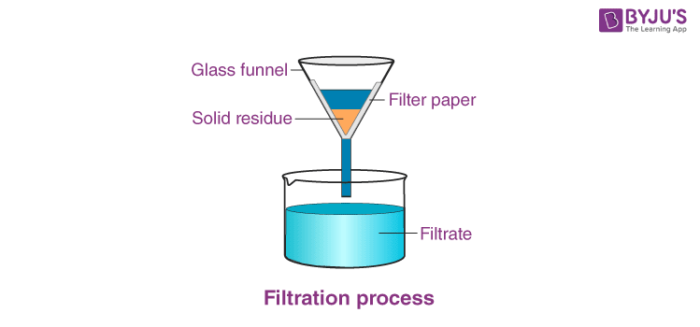A mixture is made up of two or more types of matter in varying amounts that can be physically separated using methods that use physical properties to separate the components of the mixture, such as evaporation, distillation, filtration, and chromatography.
|
Definition: Filtration is technically defined as the process of separating suspended solid matter from a liquid, by causing the latter to pass through the pores of a membrane, called a filter. |
Filtration Chemistry Questions with Solutions
Q1. Which of the following is not the application of filtration?
a.) Sterilization of media
b.) Removal of debris
c.) Plasma clarification
d.) Off-gas analysis
Correct Answer– (d.) Off-gas analysis.
Q2. Which of the following does not influence filtration?
a.) Temperature
b.) Density
c.) Viscosity
d.) pH
Correct Answer– (d.) pH
Q3. The slurry is ____.
a.) A suspension to be filtered
b.) A porous membrane used to retain the solids
c.) The solids which are present on the filter
d.) A clear liquid passing through the filter
Correct Answer– (a.) A suspension to be filtered.
Q4. The separating funnel is used mainly to segregate-
a.)Two immiscible liquids
b.) Two miscible solids
c.) Homogenous mixture
d.) Heterogeneous mixture
Correct Answer– (a.)Two immiscible liquids
Q5. The process of filtering of blood through an artificial kidney called as ___.
a.) Transplantation
b.) Dialysis
c.) Filtration
d.) Diffusion
Correct Answer– (b.) Dialysis
Q6. What are the factors that affect the filtration of the solution?
Answer. The factors that affect the filtration are:
- Temperature
- Density
- Pressure
- Viscosity
- particle size
- particle shape
- Charge
- Corrosiveness
Q7. Define filtration.
Answer. The process of separating insoluble particles from liquids is known as filtration. Physical, mechanical, and biological methods are used to separate solids from fluids. The filtrate is collected in a glass, and the residue remains on the filter.
Q8. How is the process of filtration carried out?
Answer. The most basic form of filtration is using gravity to filter a mixture. Gravity pulls the liquid down as the mixture is poured from above onto a filter medium (e.g., filter paper). While the solid remains on the filter, the liquid flows beneath it.
Q9. What are the different types of filtration?
Answer. The three types of filtration are listed below.
- Vacuum Filtration – A vacuum pump is used in vacuum filtration to draw the fluid through a filter quickly.
- Centrifugal Filtration – This method of filtration is conducted at a very high speed by spinning the material to be filtered.
- Gravity Filtration – Gravity filtration is a technique of removing impurities from liquids by dragging liquid through a filter using gravity.
Q10. Draw a diagram of the filtration process.
Answer. The given diagram of the filtration process consists of a glass funnel, filter paper, filtrate and residues. Here, filter paper helps in removing suspended solid impurities from a liquid solution.

Q11. Give some everyday examples of filtration.
Answer. Filtration is a common separation technique in everyday life, as well as in laboratories.
- Brewing coffee
- The kidneys are an example of a biological filter.
- HEPA filters are used in air conditioners and many vacuum cleaners to remove dust and pollen from the air.
- Filters with fibres that capture particulates are used in many aquariums.
- As it has been filtered through sand and permeable rock in the ground, water in an aquifer is relatively pure.
Q12. Explain the process of filtration in water treatment.
Answer. During the filtration process, clear water passes through filters with varying pore sizes and materials (such as sand, gravel, and charcoal). Dissolved particles and germs such as dust, chemicals, parasites, bacteria, and viruses are removed by these filters.
Q13. What’s the difference between reverse osmosis and filtration?
Answer. The main difference between filtration and reverse osmosis is that filtration separates using a filter medium, whereas reverse osmosis separates using a partially permeable membrane. Filtration is an analytical technique used to separate solids from liquids. Reverse osmosis is a water purification method that employs a partially permeable membrane for separation.
Q14. Explain filtration in kidneys.
Answer. The kidneys perform a number of vital functions for the body, including fluid balance and the production of hormones that aid in the production of red blood cells. However, the most important function is often considered to be its role as the body’s filtration system.
The kidneys are in charge of filtering both the blood and other waste materials that enter the body through food, drink, or medicine. Urine is the waste that exits the body.
Q15. What is the principle of filtration?
Answer. Filtration is a mechanical or physical operation that separates solids from fluids (liquids or gases) by introducing a medium through which only the fluid can pass. The filtrate is the fluid that passes through. Although oversize solids in the fluid are retained, the separation is not complete; solids will be contaminated with some fluid, and the filtrate will contain fine particles (depending on the pore size and filter thickness). Filtration is also used to describe some biological processes, particularly in water and sewage treatment, in which undesirable constituents are removed through absorption into a biological film grown on or in the filter medium, as in slow sand filtration.
Practise Questions on Filtration
Q1. Which of the following process is used to separate insoluble particles from liquids?
a.) Filtration
b.) Extraction
c.) Drying
d.) Sieving
Q2. Filtration of blood occur in-
a.) Bowman’s capsule
b.) Glomerulus
c.) Renal artery
d.) Renal vein
Q3. State True or False.
Filtration is a steady state.
Q4. Differentiate between filtration and sieving.
Q5. What is reverse osmosis filtration?
Click the PDF to check the answers for Practice Questions.
Download PDF